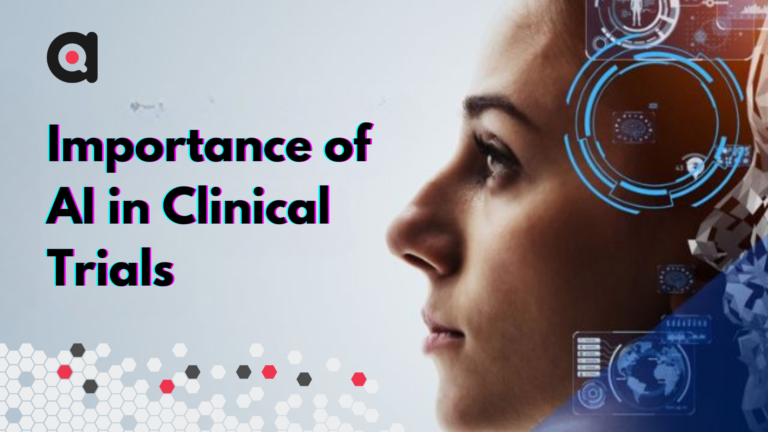Importance of AI in Clinical Trials from the Researchers’ Point of View
Table of Contents
ToggleAQ

The traditional methods of conducting and managing clinical trials are often time-consuming, expensive, and fraught with challenges. That’s why AI in clinical trials has become crucial. It holds the power to transform everything, effectively creating a bridge that connects scientific discoveries in the laboratory to real-world applications in healthcare. From diagnosing diseases to drug discovery, AI has significantly impacted the healthcare sector.
In this article, we will discuss the importance of AI and clinical trials from the perspective of researchers.
Enhanced Patient Recruitment and Retention
From patient records to clinical outcomes, Clinical trials generate an immense amount of data on a regular basis. Unfortunately, analyzing and interpreting this data can be overwhelming and prone to errors. But luckily, AI significantly improves and accelerates the process.
Artificial intelligence’s machine learning algorithms can identify patterns, correlations, and anomalies in large datasets—leading to more accurate and timely insights. This not only enhances the efficiency of the clinical trials but also improves the probability of detecting subtle treatment effects. Thus, the combination of AI and clinical trials improves the research by all means.
In short, here’s what clinical trial researchers say about how AI helps with data analysis and predictive modeling:
- Accelerates the identification of data patterns.
- Enhances the accuracy of research insights.
- Improves the efficiency of data analysis.
- Increases the probability of treatment effects detection.
- Elevates the quality of research outcomes.
Pro Tip – Using an AI-powered clinical operational platform ultimately increases operational efficiency. Try AQ CTMS for a better experience.
Drug Discovery and Development
Developing new drugs is a complex and expensive process that can take many years, right? So, AI is revolutionizing this arena by expediting the drug discovery process. Indeed, AI’s impact on drug discovery and development is undeniable. Its continued integration into clinical trial research management ensures more efficient, cost-effective, and patient-centric approaches to finding and developing life-saving medications.
Clinical trial researchers are greatly leveraging AI algorithms to sift through vast molecular datasets and predict potential drug candidates. These algorithms can analyze biological and chemical interactions—facilitating the identification of novel targets and compounds.
What’s even better is that AI helps to optimize clinical trial designs by predicting patient responses in real time. All this is to reduce the chances of trial failure while saving time and resources. A report by IBM Watson Health revealed that AI-driven patient stratification and personalized treatment protocols can increase the chances of a clinical trial’s success by up to 30%, while also reducing the cost of failed trials.
In short, here’s what clinical trial researchers say about AI drugs in clinical trials:
- Speeds up drug discovery by analyzing data for promising candidates.
- Finds new drug targets and repurposes existing drugs more effectively.
- Personalizes treatments and optimizes clinical trials by all means.
Adaptive Clinical Trials
AI’s role in clinical trials extends beyond data analysis and patient recruitment. It is also transforming the way trials are conducted. Adaptive clinical trials are an emerging approach where trial parameters are adjusted in real time based on incoming data.
AI-driven algorithms can continually assess trial progress, identify trends, and make necessary adjustments. This dynamic approach can lead to faster trial completion, reduce costs, and improve the chances of success. So, as AI continues to refine its role in clinical research—the future holds great promise for more agile, effective, and patient-centric approaches to medical discovery.
In short, here’s what clinical researchers say about using artificial intelligence to make clinical trials more adaptive:
- Acelerates adaptive clinical trials by quickly adjusting trial parameters.
- Reduces trial costs through efficient resource utilization.
- Improves the chances of success by dropping ineffective treatments.
- Enhances personalized care by matching patients with suitable treatments.
- Helps researchers understand treatment effectiveness in diverse scenarios.
The Future: Virtual and Artificial Intelligence -Enabled Trials
The future of clinical trials is not just about incorporating Artificial Intelligence but about reimagining the entire ecosystem. Virtual trials, powered by Artificial Intelligence , are set to become more prevalent. These trials can fast-track the enrollment process, reduce costs, and allow for real-time data collection and analysis.
Better Safe Monitoring
Ensuring the safety of trial participants is more than important, right? AI can assist in real-time safety monitoring, as it quickly flags malicious activities and irregularities. It can effectively analyze patient data to identify potential safety concerns early in the trial process. This enables researchers to take immediate action to protect the participants.
AI-based monitoring offers a proactive approach that enhances the ethical and moral aspects of clinical trials—demonstrating the commitment to patient welfare.
In short, here’s what clinical trial researchers say about the impact of AI on ensuring improved, real-time data monitoring:
- Automates documentation tasks, reducing administrative burdens.
- Identifies unforeseen and hidden issues promptly to help make necessary adjustments.
- Expedites the decision-making process, ensuring timely responses.
- Maintains compliance with regulatory requirements, ensuring data integrity.
- Enhances security measures, protecting sensitive patient information and trial data.
Final Words
AI in clinical trials is a game-changer for researchers. It speeds up various processes, boosts data accuracy, engages patients more effectively, fine-tunes trial designs, and ensures ongoing safety checks. This all-encompassing transformation leads to more efficient, cost-effective, and patient-focused progress in medical research and innovation.
Related Articles
AQ Platform Updates
The Transformative Impact of Telemedicine Technologies on Phase 1 Hybrid Clinical Trials
In the evolving landscape of healthcare, telemedicine Technologies are swiftly rising as a disruptive force. It’s particularly impactful in the realm of clinical trials, serving as a catalyst for innovative methodologies and faster results. Nowhere is this more apparent than in Phase 1 hybrid trials, where telemedicine is making its indelible mark. This blog will dissect how telemedicine is transforming clinical trials, spotlighting advantages, disadvantages, and its influence on study design and patient recruitment.
Thought Leadership
Transitioning from Paper to Electronic Investigator Site Files
In the world of clinical research, the advent of technology has revolutionised the way trials are conducted, managed, and documented. As a quality control expert, it’s crucial to recognize the challenges posed by paper-based investigator site files and explore the significant benefits that an electronic investigator site file (eISF) brings to the table. In this blog, we will delve into the limitations of the traditional paper system, dissect the components of the Electronic Investigator Site Files, and discuss best practices for a seamless transition and effective implementation.



